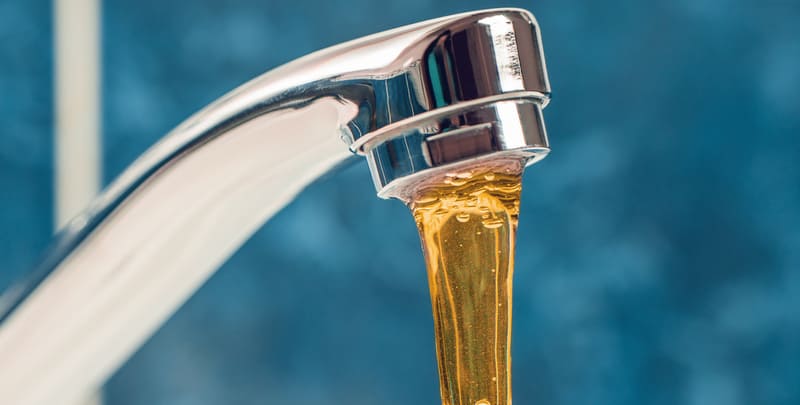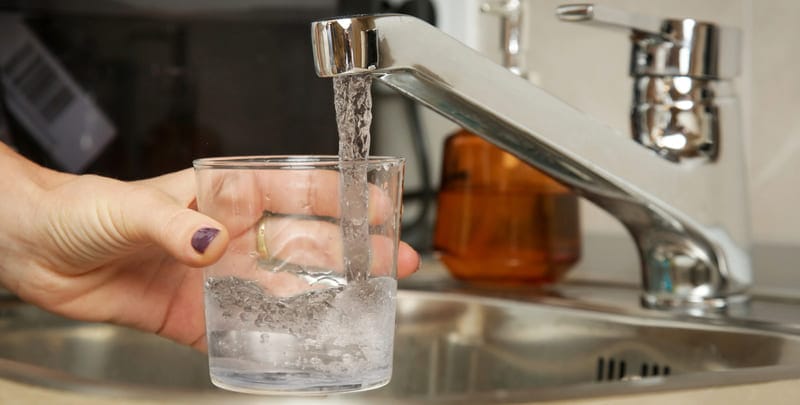
Why is My Tap Water Yellow?
To efficiently tackle yellow tap water, you first need to identify the cause. From the accumulation of rust to issues with water pressure, there are numerous potential causes. Let’s take a look at a few.
1. Rust Build-up
Try turning on your hot and cold water taps separately. If you find that only your hot water tap is producing yellow water, it might indicate the presence of rust buildup in your hot water tank.
Rust particles can begin to accumulate in even the most durable iron or steel pipes due to continuous exposure to water. This could lead to rust in your water and cause a possible change in the water colour to yellow, brown, or even a reddish hue. If the discolouration ceases after letting water flow for a short period, the issue likely originates from your home’s internal plumbing system.
2. Copper Build-up
Copper corrosion is a real issue that can lead to discoloured water. Over time, copper pipes may experience corrosion due to their prolonged exposure to acidic water with pH levels lower than 7. This corrosion causes a build-up of various substances on the internal surfaces of the pipes, which might then be released into the water supply causing it to turn yellow.

2. Sediment in Hot Water Supply Tank
Discoloured water may not always result from corroded pipes. Older water heaters can collect deposits of sediment which, when agitated, may end up in your hot water taps, causing a yellow or brownish colour. This scenario is particularly common for homes reliant on well water.
3. Water Pressure
When water pressure in the water pipes fluctuates, it can lead to the formation of cloudy yellow water. This phenomenon primarily occurs because when water pressure gets high, air dissolves into the water. As the pressure drops when water reaches the tap, the dissolved air starts to come out of the solution, forming tiny air bubbles.
These minuscule bubbles are responsible for giving the water a cloudy or milky appearance. Over time, as the bubbles rise to the surface and escape into the air, the water clears up. This process is entirely harmless, although it may temporarily affect the water’s clarity.
4. High Iron and Manganese Levels
Areas where well water is commonplace, particularly rural settings, might find that the underground geology may yield high levels of iron bacteria and manganese. These areas can accumulate rust that results in yellow or amber-toned water.
While yellow water may not always pose a serious concern, particularly if the cause is simply rust or minerals, it’s always important for homeowners to take note. If you notice a change in the colour of your water, it’s recommended to seek professional assistance to ascertain the cause and institute the necessary solution. This way, the quality and safety of your tap water is maintained.
Is Discoloured Yellow Water Safe To Drink?
This is often the big burning question that many people ask when they find themselves with yellow water. Essentially, its safety comes down to the cause of the discolouration. Yellow water infused with rust or minerals, such as iron and manganese, doesn’t usually signify any severe hazards and is relatively harmless.
However, if the discolouration is due to the presence of bacteria or organic materials like algae or decaying vegetation, it’s advisable to avoid drinking it. The Water Quality Association and numerous studies indicate that consumption of such water may lead to digestive discomfort, skin problems, or more serious health conditions.
To ensure safety, it’s recommended to drink bottled water when faced with discoloured tap water, until the problem is rectified. This becomes especially important during local council water supply flushing times, which might temporarily affect your tap water’s colour. Always giving precedence to water quality is crucial in avoiding the health hazards linked to impure water consumption.
What To Do With Yellow Tap Water
Is your water yellow? Fear not. Below are the steps you could take:
- Flush your taps – Letting your water run for a few minutes could offer an easy initial remedy. If rust is the cause of discolouration, simply flushing your pipes can often clear it.
- Get water tested – If the yellow hue persists even after running the water, it’s time to contact your local water company and ask for a water quality test. They can pinpoint the exact impurities and propose appropriate treatment options. You might even be able to find out if they’ve recently flushed their mains – that might rule out that possible cause.
- Consult with a professional plumber – If neither you nor water professionals from the water company can determine the cause, a certified water specialist or professional plumber should be consulted.
- Invest in a water purifier or filter – A trustworthy water filter can be a strong line of defence against discoloured water. Beyond enhancing the appearance and taste of your water, filters also remove harmful contaminants, making the water safe to drink. In serious cases, an advanced filtration method like reverse osmosis may be needed.
- Replace outdated, rusted pipes – Your corroded pipes may be contributing to your water turning yellow. Swiftly replacing them is key to addressing the issue and averting further complications like leaks and possible water damage.
- Regularly maintain your hot water system – If your hot water has turned yellow due to sediment in the hot water tank, regular maintenance, including flushing the heater, should be done. Ideally, this should be carried out annually to ensure optimal performance.
- Consider a water softening system – In situations where your water supply naturally contains high iron or manganese content, a water softener can help maintain the clarity and purity of your tap water.
How to Avoid Yellow Tap Water
Prevention always trumps cure, especially true when dealing with water supplies:
- Upgrade your plumbing system: Less corrosive material like copper or PVC should replace deteriorating, old pipes.
- Scheduled maintenance: Regular maintenance of your hot water system can prevent large problems in the long run.
- Water filtration: Opt for a whole-house water filtration system. It offers a real-time solution to water quality assurance.
- Regular water testing: Those dependent on well water should consistently keep tabs on the water quality to detect and fix issues promptly.
For any of these that require installation or maintenance services, you’ll need the expertise of a licensed plumber.

When and Why to Call a Plumber for Yellow Tap Water
When dealing with persistent yellow tap water issues, enlisting the help of a professional plumber or certified water specialist becomes crucial. Here are just some situations when you’ll need professional expertise.
Persistent Discolouration
If you’ve tried the suggested steps to rectify the issue, such as flushing the tap or conducting water tests, but still face persistent discolouration, it’s time to seek professional help. Persistent yellow water could signal a more complex issue within the water supply or plumbing system, one that requires expert attention.
Involvement of Bacteria or Algae
When the water tests reveal the presence of bacteria, algae, or decaying organic material, it’s essential to consult a water professional. They will identify the appropriate water treatment method that ensures the problem is addressed, safeguarding your health.
Replacing or Repairing Pipes and Fixtures
Professional plumbers are adept at dealing with pipe replacements or repairs. In cases where pipes are corroded or clogged with rust, a specialist can effectively determine the extent of damage and handle the pipe network accordingly. They will often recommend suitable pipe material like copper, or PVC to replace older pipes, minimising the risk of future issues.
Evaluating and Servicing Water Heaters
Maintenance work on water heaters needs to be done by professionals, as they possess the expertise to keep the hot water system functioning correctly. Annual flushing and maintenance of water heaters are essential to ensure optimal performance and professional guidance proves invaluable in such tasks.
Installing Water Treatment Systems
Certified plumbers can also install water treatment systems like water softeners or whole-house water filtration systems. By seeking assistance from experienced professionals like Mr. Emergency, you can ensure proper installation and reliable long-term solutions for better water quality.
Seek Expert Assistance with Your Tap Water Quality
The appearance of yellow water from your tap can be quite unsettling. However, knowledge is power and a good understanding of this phenomenon can defuse panic.
It’s important to remember that this discolouration usually points towards simple plumbing issues such as rusted pipes, sediment accumulation in your hot water tank, or reaction to naturally occurring minerals.
Adopting practices like regular maintenance of your water systems, water testing, and filtration can make a significant difference. The expertise of a professional plumber should never be overlooked when in doubt. Unquestionably, access to clean, safe drinking water is non-negotiable for leading a healthy life.
With this knowledge under your belt, you should feel more prepared and less alarmed by the sight of yellow water, swiftly act instead. Remember, safe water is a necessity, not a luxury – no one should have to make do with less.
Please note: This information is provided for advice purposes only. Regulations differ from state to state, so please consult your local authorities or an industry professional before proceeding with any work. See our Terms & Conditions here.


